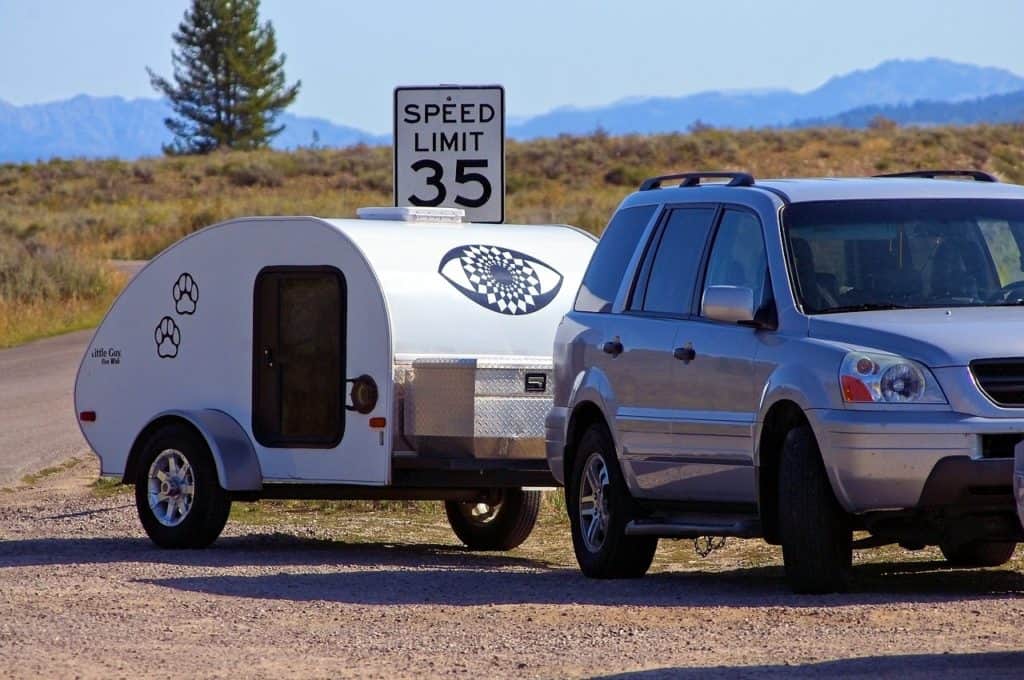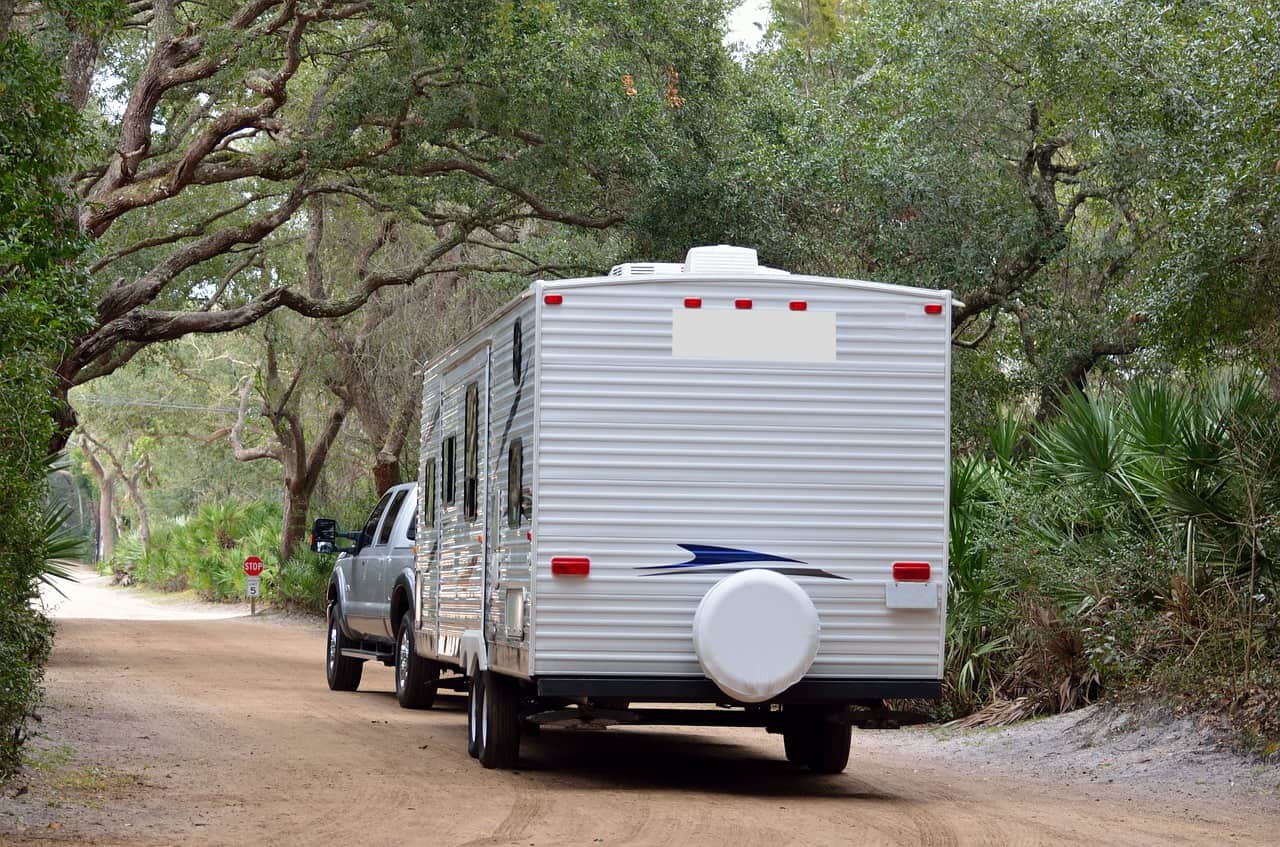There are a lot of best practices and opinions out there when it comes to towing and max towing capacity.
However, the “80 Rule for Towing” has to be one of the most popular and widely used rules for towing.
80 Rule for Towing
The “80 Rule for Towing” states you should never exceed 80 percent of your vehicle’s max tow capacity, which is set by the vehicles manufacturer.
So for example, if your tow vehicle has a max towing capacity of 5,000 pounds, you would not want to pull or tow anything heavier than 4,000 pounds.
But to get a better sense of how this affects vehicle tow capacity in the real world, let’s take a look at some popular tow vehicles and apply the “80 Rule for Towing” to their max towing capacities.
Popular Tow Vehicles
| 2021 Models | Max Tow Capacity | 80 Rule for Towing (Applied) |
| Ford F-150 | 5,000 – 11,300 Pounds | 4,000 – 9,040 Pounds |
| Chevy Silverado 1500 | 7,200 – 9,700 Pounds | 5,760 – 7,760 Pounds |
| RAM 1500 | 6,150 – 8,420 Pounds | 4,920 – 6,736 Pounds |
| Toyota Tundra | 8,800 – 10,200 Pounds | 7,040 – 8,160 Pounds |
| Chevy Tahoe | 7,600 – 7,900 Pounds | 6,080 – 6,320 Pounds |
| Ford Explorer | 5,300 – 5,600 Pounds | 4,240 – 4,480 Pounds |
| Jeep Grand Cherokee | 3,500 – 7,200 Pounds | 2,800 – 5,760 Pounds |
| GMC Yukon | 7,500 – 7,900 Pounds | 6,000 – 6,320 Pounds |
| Dodge Durango | 6,200 – 8,700 Pounds | 4,960 – 6960 Pounds |
| Cadillac Escalade | 7,500 – 7,700 Pounds | 6,000 – 6,160 Pounds |
As you can see from the table above, when you apply the “80 Rule for Towing” to a vehicle’s max tow capacity, it can have a big impact on how much the vehicle can tow.
Which can greatly affect the size and type of trailer you could potentially tow with the vehicle.
So is the “80 Rule for Towing” really necessary and is it something you should follow?
Keep reading to find out, as we explore both of these questions in-depth.
Why is the 80 Rule for Towing a Good Idea?
If you own a tow vehicle with a max tow capacity of 5,000 pounds, it’s understandable that you wouldn’t want to give up 1,000 pounds of potential towing capacity, by applying the “80 Rule for Towing” to the vehicle.
After all, losing 1,000 pounds of towing capacity can have a big impact on the type and size of trailer or camper that you could potentially tow with the vehicle.
So why do people use the “80 Rule for Towing” in the first place?
People use the “80 Rule for Towing” as a good rule of thumb because of how the max tow capacity is set and to provide some cushion.
What Does Max Tow Capacity Mean?
The max tow capacity of a vehicle is the maximum amount of weight that a particular vehicle can tow reliably and safely, as set by the vehicle’s manufacturer.
And the manufacturer determines this max towing capacity, by taking into account the vehicle’s gross weight rating, gross combined weight rating, gross axle weight rating as well as the vehicle’s suspension, engine type, transmission, and brakes.
So if the manufactuer states that you can tow up to a certain maximum amount, which is what the max tow capacity is, why not tow right up to that amount?
There are actually several reasons why should avoid maxing out your tow vehicle.
Why You Should Avoid Maxing Out Your Vehicles Towing Capacity
- When vehicle manufacturers set the max towing capacity for their vehicles, they often set those limits under idle conditions, which usually includes a 0-degree grade, no crosswinds, and a level and paved road. Which doesn’t take into account more real-world driving conditions that can hinder the vehicles towing capacity.
- While I’m not suggesting that vehicle manufacturers exarate towing capacities to unsafe levels. It’s worth mentioning that higher towing capacities for vehicles are definitely a selling feature. And that manufacturers do have a vested interest in getting that number as high as possible. Which is why there can be a big difference in the max towing capacity of a vehicle and what a vehicle can actually comfortably tow.
- While you probably know the dry weight of your trailer or camper, you more than likely don’t know the exact fully loaded weight of the trailer. And without knowing the exact fully loaded weight of your trailer, there is no way to know how close you really are to the max towing capacity of the vehicle.
So in my opinion because of all the above reasons, you always want to leave a cushion as well as some margin for error, when towing a trailer or camper, by staying substantially below the max towing capacity of your vehicle.
And one of the best ways to do this is by applying the “80 Rule for Towing“.

How Much of Your Towing Capacity Should You Use?
While you can technically tow up the max tow capacity of your vehicle, it’s generally accepted and recommended that you avoid doing this to avoid undue wear and tear on your vehicle.
So how much of your max towing capacity should you use when towing?
While there is no exact amount of capacity you should use, as every towing situation is different, many people that tow a trailer or camper use the “80 Rule for Towing”, which states not to tow more than 80% of the tow vehicle’s max towing capacity.
What Happens If You Tow Something to Heavy?
Towing a trailer that weighs more than the max towing capacity of a vehicle, can greatly shorten the life of the tow vehicle by causing excessive wear and tear to the vehicle and can also affect everyone’s safety on the road.
Below are some of the most common problems associated with towing a trailer too heavy for your tow vehicle.
- Can cause strain and damage to the tow vehicle’s engine and transmission.
- Lead to rapid brake wear.
- Cause premature damage and uneven wear on tires.
- Can warp or damage the tow vehicle’s chassis and or axle.
- Cause gas mileage to dramatically drop off.
- Potentially lead to brake failure while driving, which could lead to property damage and or serious injury.
- Cause the tow vehicles front tires to lose transaction, due to overloaded weight on the rear bumper and hitch.
Can You Increase a Vehicle’s Towing Capacity?
Because buying a new tow vehicle can be an expensive proposition, you might be wondering if there is a way that you could somehow increase the towing capacity of your existing vehicle.
But sadly there is no way to increase a vehicle’s towing capacity without completely reengineering the vehicle, as manufacturers use a wide variety of vehicle components and factors to calculate the max towing capacity of a particular vehicle.
So even if you were to beef up the suspension of the vehicle or install better brakes, that would still leave things like the engine, transmission, axles, and chassis untouched, which would prevent the vehicle from towing any additional weight.
So if you need more towing capacity than your current vehicle offers, the best and the only thing to do is buy a new tow vehicle that has the max towing capacity you need.

How Much Can a 1/2 Ton Truck Tow?
Just like any other type of vehicle, there can be a wide range, when it comes to the towing capacity of a ½ ton truck, even when it comes to the same truck.
For example, the ½ ton Ford F-150 has a max tow capacity that ranges from 5,000 to 11,300 pounds, due to the different types of engines, transmissions, and suspension that can be optioned on the truck.
So it’s always best practice to consult your owner’s manual or look on the inside of the driver’s door well for the max towing capacity of the truck.
However, in general, a ½ ton truck will usually have a max towing capacity between 5,000 and 10,000 pounds.
But if your curious about what a specific ½ ton truck can tow, check out the below table that lists every half-ton truck on the road and its corresponding max towing capacity.
1/2 Ton Trucks
| 2021 Model | Max Towing Capacity |
| Ford F-150 | 5,000 – 11,300 Pounds |
| Chevy Silverado 1500 | 7,200 – 9,700 Pounds |
| GMC Sierra 1500 | 7,400 – 9,500 Pounds |
| RAM 1500 | 6,150 – 8,420 Pounds |
| Toyota Tundra | 8,800 – 10,200 Pounds |
| Nissan Titan | 9,210 – 9,400 Pounds |
What Size Truck Do I need to Tow 7,000 Pounds?
While larger trucks do exist, the most popular truck sizes for consumers is the ½ ton, ¾ ton, and 1-ton truck.
But if you want to tow 7,000 pounds, the best size truck will either be a heavy-duty half-ton truck on the higher side of the ½ ton towing capacity or a ¾ ton truck, which will easily tow 7,000 pounds.
As a ½ ton truck will usually have a towing capacity between 5,000 and 10,000 pounds, while a ¾ ton truck will typically have a towing capacity between 10,000 and 15,000 pounds.

What Size Truck Do I need to Pull a 30-Foot Travel Trailer?
When trying to figure out what size truck you need to pull a 30-foot trailer, the fully loaded weight of the trailer is more important than the overall length.
So to figure out what size truck you need to pull a 30-foot trailer, you first need to know the average weight of a 30-foot trailer.
A 30-foot travel trailer will typically have a dry weight between 4,500 and 6,500 pounds.
However, you then need to add 1,000 to 1,500 pounds to this weight for cargo, which means that a fully loaded 30-foot travel trailer will typically have a weight between 5,500 and 7,500 pounds.
Making it possible for a ½ ton truck to pull a 30-foot travel trailer, if the truck is on the higher side of the ½ ton truck towing capacity, as a half-ton truck will usually have a towing capacity between 5,000 and 10,000 pounds.
But to ensure you can comfortably tow a 30-foot travel trailer, it’s best to step up to the ¾ ton truck, like an F-250 or RAM 2500, which will have a towing capacity between 10,000 and 15,000 pounds.
What Size Truck Do I need to Pull a 5th Wheel?
While there are a few RV manufacturers that are making 5th wheels they claim can be towed by a ½ truck, it’s best to step up to ¾ ton or 1-ton truck, if you want to pull a 5th wheel, as they will have the towing capacity you really need.
As even the lightest standard 5th wheels will usually have a fully-loaded weight of close to 10,000 pounds, which would either greatly exceed or completely max out the towing capacity of a ½ ton truck.
However, there is one exception to this, which is the ultra-lightweight fiberglass 5th wheel.
Such as the 19-foot Scamp 5th wheel, which has a dry weight between 2,000 and 2,900 pounds and a fully-loaded weight between 3,200 and 3,600 pounds.
But these 5th wheels are so rare it’s hardly worth mentioning.
Are you curious how trailer sway bars work? If so check out our article “What are Trailer Sway Bars and are They Necessary?“.
Recent Posts
47 RV Storage Ideas to Maximize Your Space for Compact Living
Camping and living in an RV is an incredible adventure, but it comes with its fair share of challenges, particularly around storage, due to the lack of space. Because of this, it's a must to make...
Are you looking to give your RV a cozy, rustic makeover? If so, farmhouse decor is the perfect style to transform your camper into a warm and inviting home on wheels. In this blog post, I'll...

